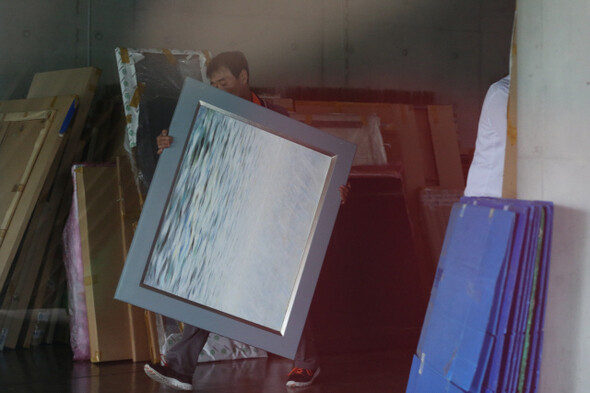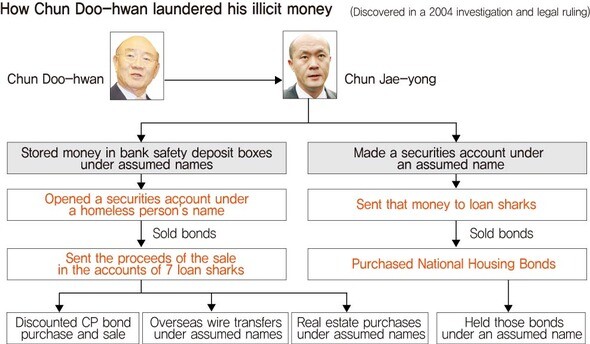hankyoreh
Links to other country sites 다른 나라 사이트 링크
Former president Chun’s tangled web of money laundering

By Kim Won-chul and Song Kyung-hwa, staff reporters
Former president Chun Doo-hwan, 82, divided the hundreds of billions of won in illicit funds he had received from chaebol during his time in office and put it into hundreds of accounts under false names or assumed names, investigators say. Every three months, he laundered this money by moving it to accounts under other assumed names.

With thousands of people’s names being used to maintain Chun’s slush fund, the prosecutors who were investigating the case in 1995 and 1996 reportedly ended the investigation because of the difficulty in tracking all of the different accounts.
On July 18, a Hankyoreh reporter spoke with multiple people who had been involved in the prosecutors’ investigation of Chun’s illicit funds. These people said that Chun would repeatedly put 300 to 500 million won (US$266,425-444,000) in a assumed-name or false-name account and then move the money to another assumed-name or false-name account a few months later.
“There was about 300 to 500 million won in each of 700 to 800 assumed-name accounts,” said a source who was part of the investigation at the time and spoke on condition of anonymity. “With the majority of these accounts, the money would be withdrawn about three months later on average, and we would lose the trail.”
“There were also times when the money would be taken out and moved to another assumed-name account after only a month and a half,” the source said. “It seemed like experts in the financial industry were meticulously managing the slush fund.”
Generally, the person laundering the money would go to one window at a bank branch and withdraw all of the money from an assumed-name account. Then they would go to another window at the same branch and create another assumed-name account under a different name and deposit the money there.
Because of this, the team of investigators would have to look through all of the deposit slips in a bank branch on a day when 300 million won had been withdrawn from an account. They were trying to find an account in which a similar amount of money had been deposited.
“I recall thinking that if the money was being split up and controlled like that, the total must be much higher than 200 billion won,” another investigator said on condition of anonymity.
“Since they were moving the money every few months, there were thousands of names involved. This is why it was also pointless to call in the account holders for questioning.”
“We decided to stop tracking the bank account information when we realized that even with a dedicated team of dozens of agents it would take years to figure out where all the money had gone,” the source said.
The official announcement made by the prosecutors at the time was that they had traced 183 assumed-name and false-name accounts belonging to Chun and other accounts that were linked to these.
The prosecutors got the financial authorities to give them the numbers of accounts controlled by Chun that had been registered in the names of his relatives. They met with managers of bank branches and viewed Chun’s accounts.
They also summoned the heads of chaebol to hotels and secured testimony that they had given 10 to 20 billion won to Chun.
It was estimated that Chun collected 950 billion won from chaebol during his time in office. The prosecutors believed that he had used 577.45 billion won of this fund as so-called “control funds,” so when they indicted him, they only charged him with accepting 229.55 billion won in bribes. In 1997, the Supreme Court recognized 220.5 billion won of this as bribe money.
On July 18, the special task force (headed by Kim Hyung-jun) from Seoul Central District Prosecutors’ Office for collecting outstanding fines from the Chun family added eight new investigators from the accounting analysis and account tracking sections of the Supreme Prosecutors’ Office.
The task force also brought in art experts to begin appraising the artwork seized from the properties of Chun and his relatives.
It was confirmed that when the prosecutors searched the houses of Chun’s two sons, the warrant they used had been issued on suspicion that the Act on Regulation and Punishment of Criminal Proceeds Concealment had been violated.
Please direct questions or comments to [english@hani.co.kr]

Editorial・opinion
![[Column] Season 2 of special prosecutor probe may be coming to Korea soon [Column] Season 2 of special prosecutor probe may be coming to Korea soon](https://flexible.img.hani.co.kr/flexible/normal/500/300/imgdb/original/2024/0426/3317141030699447.jpg) [Column] Season 2 of special prosecutor probe may be coming to Korea soon
[Column] Season 2 of special prosecutor probe may be coming to Korea soon![[Column] Park Geun-hye déjà vu in Yoon Suk-yeol [Column] Park Geun-hye déjà vu in Yoon Suk-yeol](https://flexible.img.hani.co.kr/flexible/normal/500/300/imgdb/original/2024/0424/651713945113788.jpg) [Column] Park Geun-hye déjà vu in Yoon Suk-yeol
[Column] Park Geun-hye déjà vu in Yoon Suk-yeol- [Editorial] New weight of N. Korea’s nuclear threats makes dialogue all the more urgent
- [Guest essay] The real reason Korea’s new right wants to dub Rhee a founding father
- [Column] ‘Choson’: Is it time we start referring to N. Korea in its own terms?
- [Editorial] Japan’s rewriting of history with Korea has gone too far
- [Column] The president’s questionable capacity for dialogue
- [Column] Are chaebol firms just pizza pies for families to divvy up as they please?
- [Column] Has Korea, too, crossed the Rubicon on China?
- [Correspondent’s column] In Japan’s alliance with US, echoes of its past alliances with UK
Most viewed articles
- 1Division commander ordered troops to enter raging flood waters before Marine died, survivor says
- 2‘We must say no’: Seoul defense chief on Korean, USFK involvement in hypothetical Taiwan crisis
- 3Is N. Korea threatening to test nukes in response to possible new US-led sanctions body?
- 4No good, very bad game for Korea puts it out of Olympics for first time since 1988
- 5Korea’s 1.3% growth in Q1 signals ‘textbook’ return to growth, says government
- 6US overtakes China as Korea’s top export market, prompting trade sanction jitters
- 7[Column] Has Korea, too, crossed the Rubicon on China?
- 8[Column] ‘Choson’: Is it time we start referring to N. Korea in its own terms?
- 9Will NewJeans end up collateral damage in internal feud at K-pop juggernaut Hybe?
- 10Samsung subcontractor worker commits suicide from work stress